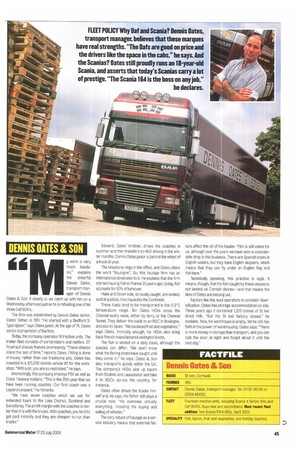DENNIS OATES 81, SON
Page 45

If you've noticed an error in this article please click here to report it so we can fix it.
y work is very much handson," explains the cheerful Dennis Oates, transport manager of Dennis Oates & Son. It clearly is: we catch up with him on a Wednesday afternoon just as he is refuelling one of his three Daf 95XFs.
The firm was established by Dennis Oates senior, Oates' father, in 1951. "He started with a Bedford SType tipper," says Oates junior, At the age of 74, Oates senior is proprietor of the firm.
Today, the company operates 14 tractive units. The trailer fleet consists of curtainsiders and reefers. GT Fruehauf chassis feature prominently. "These chassis stand the test of time,' reports Oates. Fitting is done in-house; rather than use traditional pits, Oates has invested in a 115,000 mobile vehicle lift for the workshop. "With a pit, you are so restricted," he says.
Interestingly, this company employs PSV as well as Class 1 licence holders. "This is the 25th year that we have been running coaches. Our first coach was a Leyland Leopard," he remarks.
"We have seven coaches which we use for extended tours to the Lake District, Scotland and Eurodisney. The profit margin with the coaches is better than it is with the trucks. With coaches, you tend to get paid instantly and they are cheaper to run than trucks." Edward, Oates' brother, drives the coaches in summer and then transfers to HGV driving in the winter months. Dennis Oates junior is behind the wheel of a truck all year.
The telephone rings in the office, and Oates utters the word "Boulogne'. So, this haulage firm has an international dimension to it. He explains that the firm started hauling fish to France 20 years ago; today, fish accounts for 60% of turnover.
Hake and Dover sole, all locally caught, are landed, sold at auction, then hauled to the Continent.
These loads tend to be transported in the 0-2°C temperature range. Ten Oates HGVs cross the Channel every week, either by ferry or the Channel Tunnel. They deliver the loads to an RDC in Boulogne, and also to Spain. "We backload fruit and vegetables," says Oates. Ironically enough, his HGVs also bring back French-manufactured wellington boots.
The fish is landed on a daily basis, although the species can differ: "We don't know what the fishing boats have caught until they come in," he says. Oates & Son also transports goods within the UK. The company's HGVs pick up bacon from Bodmin and Launceston and take it to ADCs across the country, for instance.
Oates often drives the trucks himself and, he says, his father still plays a crucial role: "He oversees virtually everything, including the buying and selling of vehicles."
The very nature of haulage as a service industry means that external fac
tors affect the lot of the haulier. "Fish is still viable for us, although over the years we have seen a considerable drop in this business. There are Spanish boats in English waters, but they have English skippers, which means that they can fly under an English flag and fish here."
Technically speaking, this practice is legal. It means, though, that the fish caught by these vessels is not landed on Cornish shores—and that means the likes of Oates are missing out.
Factors like this lead operators to consider diversification. Oates has storage accommodation on site. Three years ago it contained 1,200 tonnes of St lvel dried milk. "But the St WI factory closed," he explains. Now, his warehouse is empty. Yet he still has faith in the power of warehousing. Oates says: "There is more money in storage than transport, and you can lock the door at night and forget about it until the next day."
















































































































































































